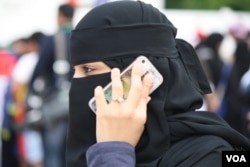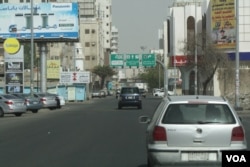"Business is always good here,” store clerk Mohammad Ali said, pointing to the rows of clothing in his shop in the Saudi capital.
But a month after Saudi Arabia severed formal relations with Iran, the calm in Riyadh belies a growing fear in the region. The two regional giants are often at odds, but now, with no diplomatic ties, they are teetering between peace talks and escalating proxy wars in Syria and Yemen.
For many Saudis, victory for Iran’s allies in either conflict would threaten the kingdom militarily and psychologically.
Yet as Iran rejoins world markets after an international nuclear agreement, some Saudi analysts say the new dynamic presents not just a threat, but an opportunity.
“We are in the same boat,” said Mohammad al-Sabban, a former senior adviser to the Saudi minister of petroleum. “Either we have to sink together or we have to swim together.”
The quarrel
In this quiet, ancient market, locals say the quarrel between Saudi Arabia and Iran has little to do with the people who would be harmed, in either country, if the conflict escalated.
The current row is an extension of a decades-old rivalry and, some argue, the product of a rift within Islam between Shi’ite and Sunni Muslims more than a thousand years ago. Iran is the world’s most powerful Shi’ite-led nation and Saudi Arabia is arguably the strongest Sunni-led state. Throw in ethnic differences — Arab versus Persian — and the split widens.
Last month, Saudi Arabia executed a prominent Shi’ite sheikh, causing anger across the Shi’ite world, especially in Iran. After protesters attacked Saudi Arabia’s embassy in Tehran, the kingdom, along with Kuwait, Bahrain, Sudan and the United Arab Emirates, downgraded or cut formal ties.
The Iranian government condemned the attack, saying more than 100 people have been arrested. Still, people here blame Iranian leaders for the incident.
“Iran is our neighbor,” said essential oil seller Abu-Talal Sultan, sipping a small glass of tea. “It’s their government’s political agenda. They don’t even care for their own people.”
But Sultan added that Iranians and Saudis are more alike than different.
“We are all Muslim,” he said.
Military map
Iran gives direct support to the Syrian government in its war against rebel factions and Islamic State militants, and it is widely believed to support Houthi rebels battling Yemen's Saudi-backed government. Saudi analysts view these as Iranian attempts to build up allies in the region.
With Shi’ite militias in Iraq, and Egypt’s growing alliance with Russia, which also supports Damascus, the possibility of Iranian hegemony in the Middle East has become a threat comparable to a “1939 moment,” according to Jamal Khashoggi, a prominent Saudi journalist, making a comparison with Germany’s bid to overrun Europe in World War II.
Over the past year, Saudi Arabia has felt sidelined as Iran's global importance has grown, according to Hamad al-Shehri, an academic adviser for the Saudi Ministry of Foreign Affairs.
While negotiating a nuclear deal intended to curb Iran’s nuclear program in exchange for relief from economic sanctions, Iran’s relatively new leadership preached moderation and cooperation.
But Saudis were incredulous that the West did not take a strong stand against Iranian involvement in Syria, Yemen and other regional conflicts, al-Shehri said.
“The United States are our allies,” he said. “We wanted them to send a clear message to the Iranians to stop their interfering and to stop supporting smuggling weapons to those militias.”
For Saudis, he said, the threat of a future nuclear weapon in Iran is not nearly as immediate as the threat of the ongoing wars in the Middle East.
Economic worries, opportunities
Within three months, Iran could be exporting 500,000 barrels of oil per day, and possibly 1 million more by the end of the year, according to al-Sabban, the former senior adviser to the Saudi oil minister.
This oil will be entering an already flooded market that has driven down prices to below $30 a barrel — a blow to all oil-producing countries, including Saudi Arabia.
“That will have an impact,” al-Sabban said. “If you add it to the existing oil glut, or oil surplus, definitely that will impact prices.”
On the other hand, the economic co-dependency of competing in the same market may force both countries to compromise, said John Sfakianakis, who has advised the Saudi government and serves as chief economist for several Saudi banks.
The only way for oil-producing countries to raise prices globally, he said, is to reduce production. Saudi Arabia has said it will not unilaterally reduce production, lest it lose market share to competitors.
“Saudi Arabia is not going to budge,” Sfakianakis emphasized.
This means oil-producing nations will have to work together, or they will all continue to suffer, al-Sabban said.
Saudi Arabia could also reap economic benefits through trade with Iran, according to Khaled Almaeena, a veteran Saudi journalist.
“Especially now that Iran has joined the world community,” Almaeena said in his office overlooking the Red Sea.
Repairing diplomatic relations is more complex than trade for mutual benefit.
On Tuesday, Iranian Foreign Minister Mohammad Javad Zarif called on Saudi Arabia to end its “hostile policies” toward Iran. In Saudi Arabia, Almaeena and other analysts say it is Iranian policies that must change to move forward.
“Good relations between Saudi Arabia and Iran — provided Iran also comes to its senses — is good for the Muslim world,” Almaeena said. “It is good for the Arab world.”








